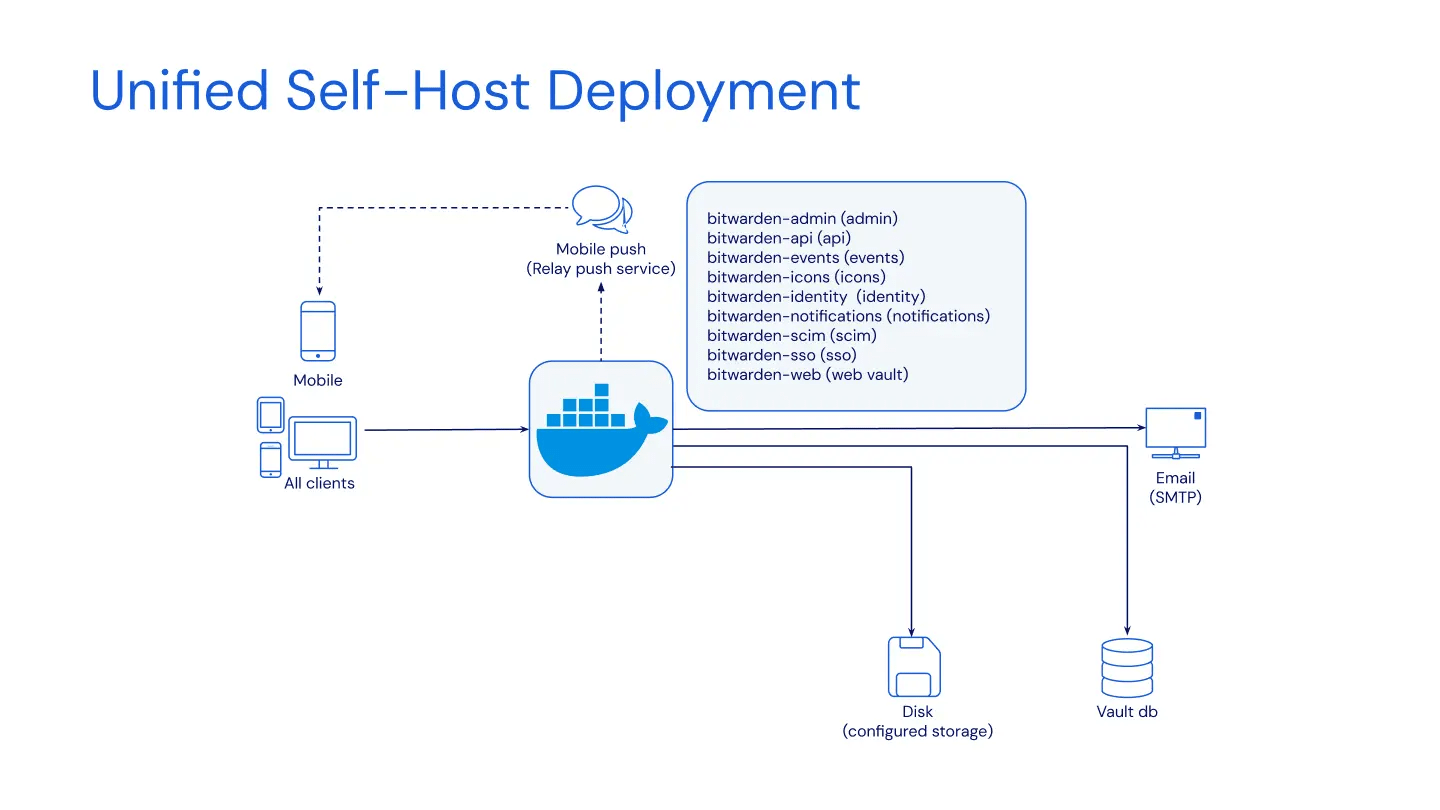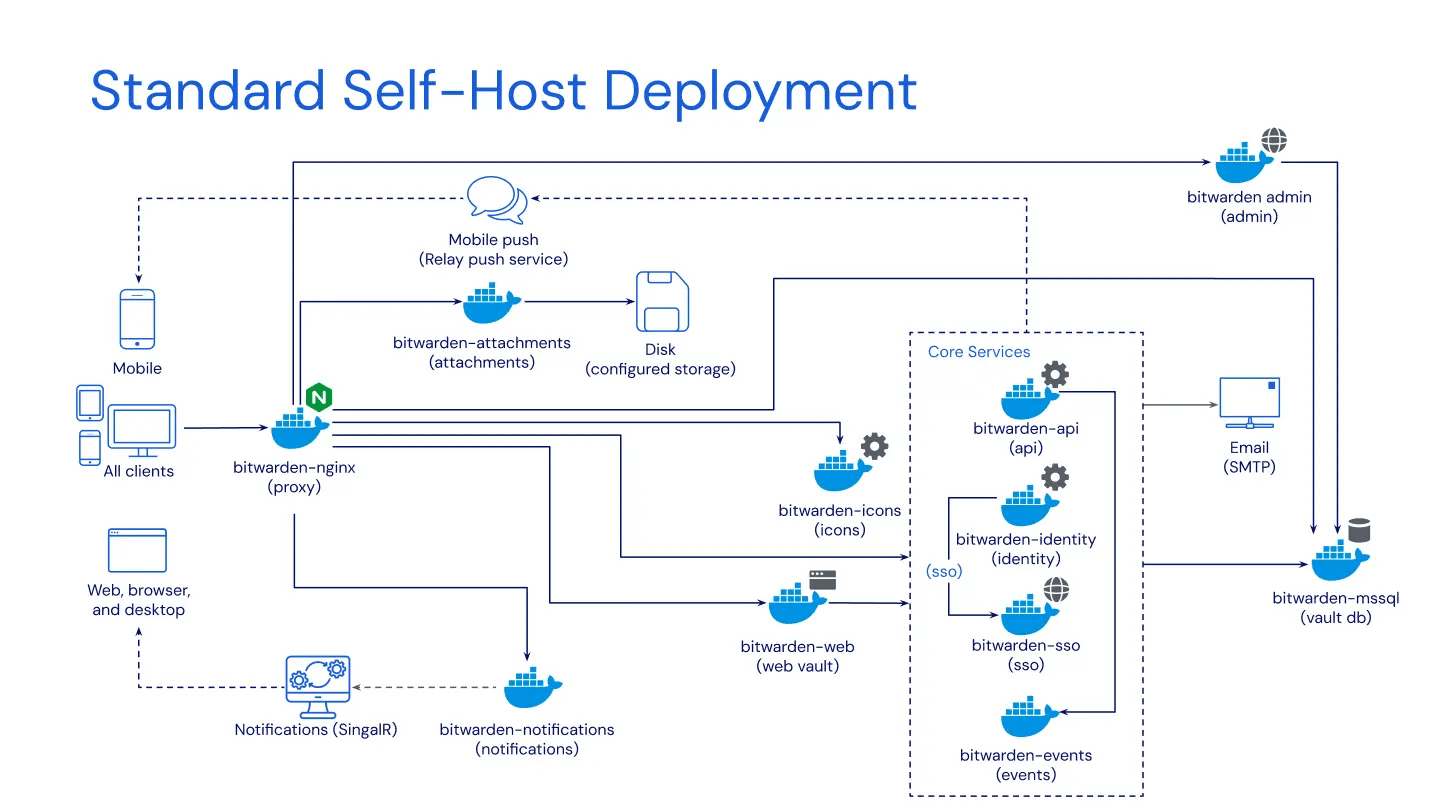New deployment option for self-hosted Bitwarden
- Blog
- New deployment option for self-hosted Bitwarden
For those with the resources to install, run, and maintain hardware, Bitwarden offers an exciting, flexible deployment option for self-hosted environments. The Bitwarden unified self-hosted deployment joins the standard deployment option as a lightweight alternative for those who choose to deploy and manage their password management solution on their private network or infrastructure.
Note: This is a beta release, which means it may be unstable and have issues. If you manage a Bitwarden organization vault, we recommend using the officially supported, standard deployment option until the unified Bitwarden self-hosted option becomes stable.
Bitwarden, the password manager trusted by millions of individuals and businesses to secure their sensitive information and passwords online, offers multiple options for users to host their password manager on their own server. This approach provides enhanced control over data and security settings, enabling businesses and individuals to manage their sensitive data in a secure and customizable environment. Self-hosting Bitwarden is ideal for organizations with special hosting requirements like government entities, or individuals who self-host other software solutions in their homelab.
Self-hosting a password manager like Bitwarden offers several compelling benefits, including:
Enhanced autonomy over data
Ability to adapt deployment to meet unique organizational or personal compliance standards.
Flexibility to deploy on-premises or in the cloud based on your infrastructure and security preferences.
The Bitwarden unified self-host deployment option, initially available in open beta, supports a streamlined and flexible setup. It allows users to choose from multiple databases (including an SQLite database and custom database ports) and environment options while being resource-efficient.
The Bitwarden unified self-host deployment option offers the following:
A simplified Docker deployment with all services running in a single Docker container.
Database flexibility and portability allow users to easily utilize different types of database solutions to host their Bitwarden server, including Microsoft SQL Server, MySQL, PostgreSQL, and SQLite.

Bitwarden is excited to partner with the Bitwarden community in this open beta. If you decide to deploy the Bitwarden self-hosted option, please report any issues you discover in GitHub. Current known issues for the unified deployment can be viewed on that same page.
Learn more about how to get started with the unified deployment in this demo with Bitwarden founder Kyle Spearrin.
You'll need Docker and/or Docker Compose installed to successfully deploy this option. Learn how to deploy the Bitwarden unified self-hosted deployment.
The standard self-host deployment has been available since the beginning of Bitwarden and supports hosting on Linux, macOS, and Windows machines. Configured to use a Microsoft SQL Server database, it utilizes multiple Docker containers orchestrated via Docker Compose for self-hosting Bitwarden servers. Deployment is also available via a DigitalOcean droplet for users interested in a one-click cloud-based solution.

The core differences between the Bitwarden unified and standard self-host deployment options are shown in the table below:
Standard deployment | Unified deployment | |
|---|---|---|
Database supported | Microsoft SQL Server | Multiple database providers including Microsoft SQL Server, MySQL, PostgreSQL, and SQLite |
CPU architecture | x64 | x64, ARMv7, ARM64 |
Deployment solutions supported | Docker DigitalOcean | Docker Note: more deployment solutions will be available in the future |
Docker architecture | 11 containers via Docker Compose | 1 container |
One of the most important differences between the Bitwarden unified and standard self-host options is that the unified route only requires the deployment of a single container. In contrast, the standard deployment uses eleven different Docker containers, making the unified approach much simpler for those who might not be as familiar with containers and Docker.
Other helpful articles and resources for deploying a self-hosted Bitwarden server:
Ranked by G2 and SoftwareReviews as the number one password manager, Bitwarden offers business and individual plans that help everyone secure sensitive information online. Check out a weekly live demo or visit our pricing page to find the right plan for you!